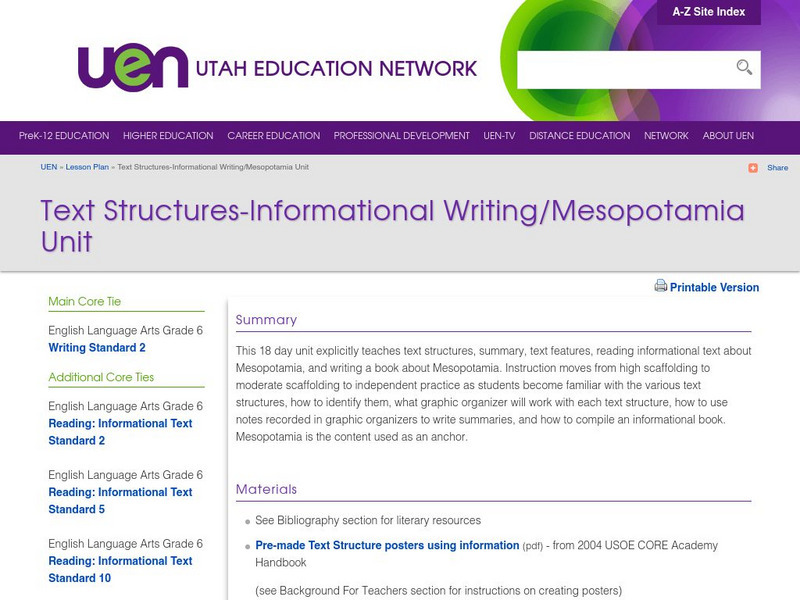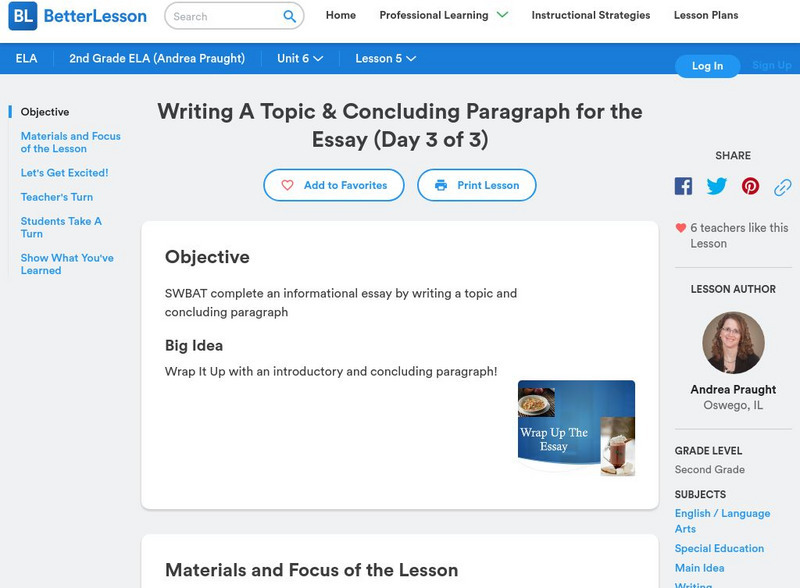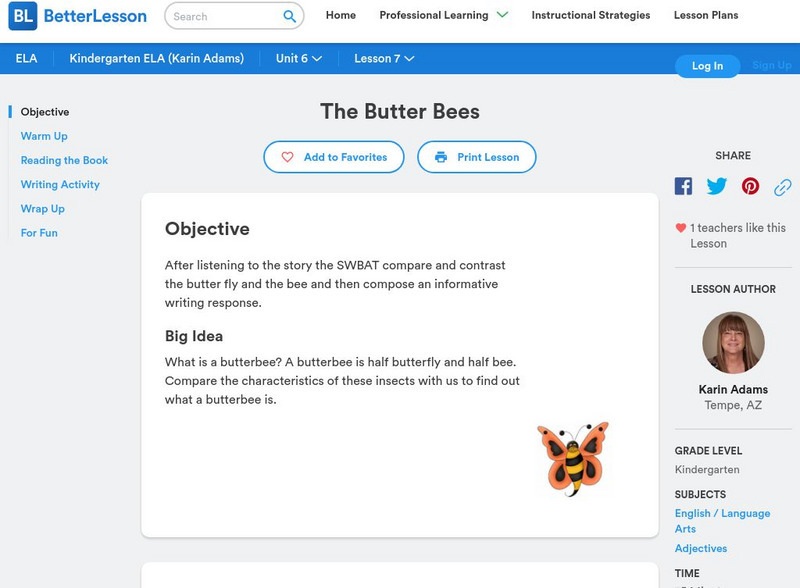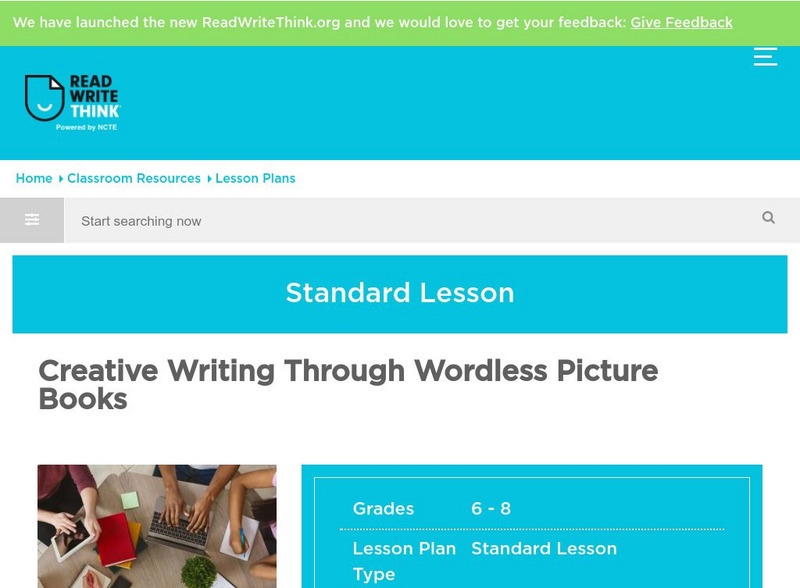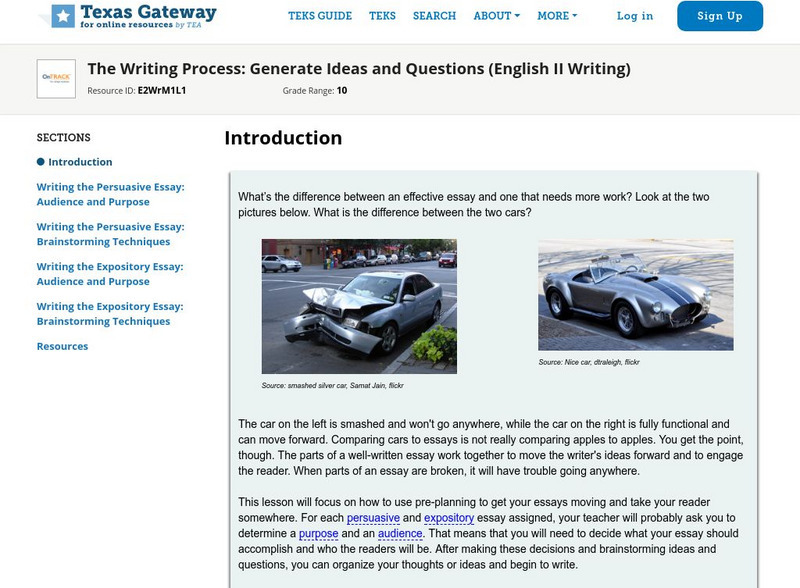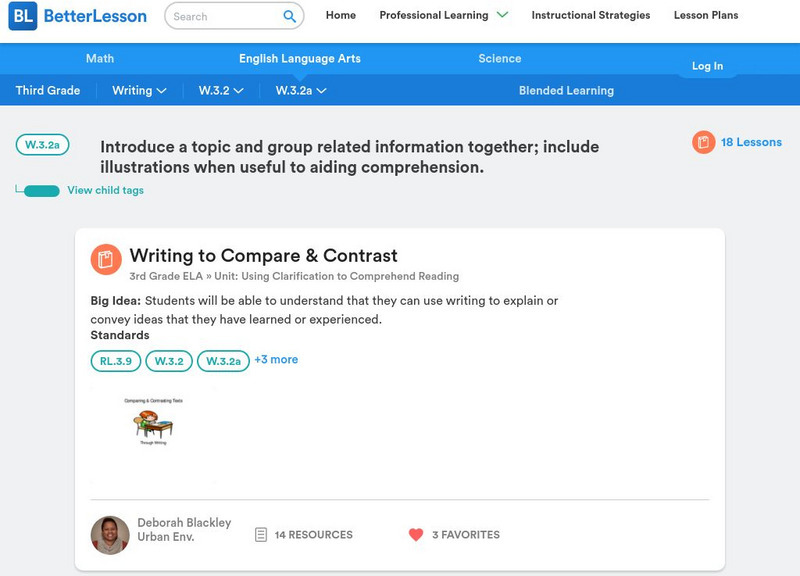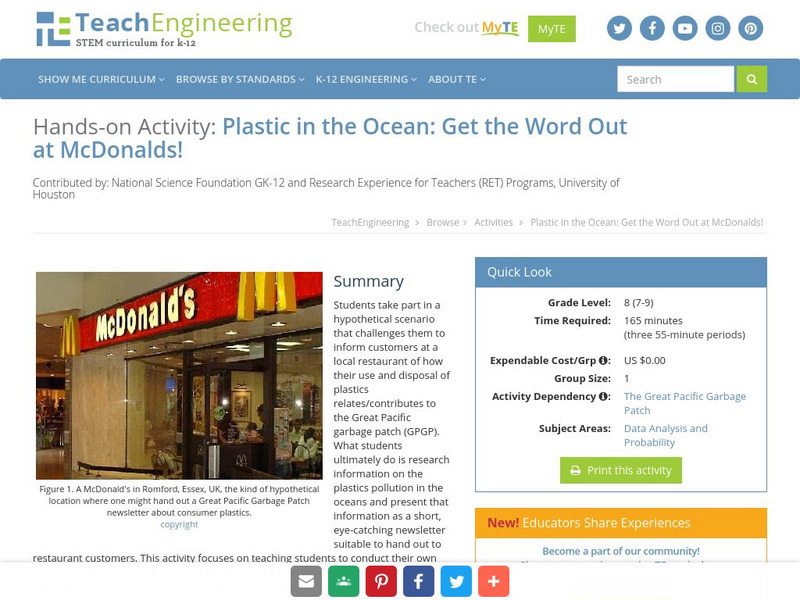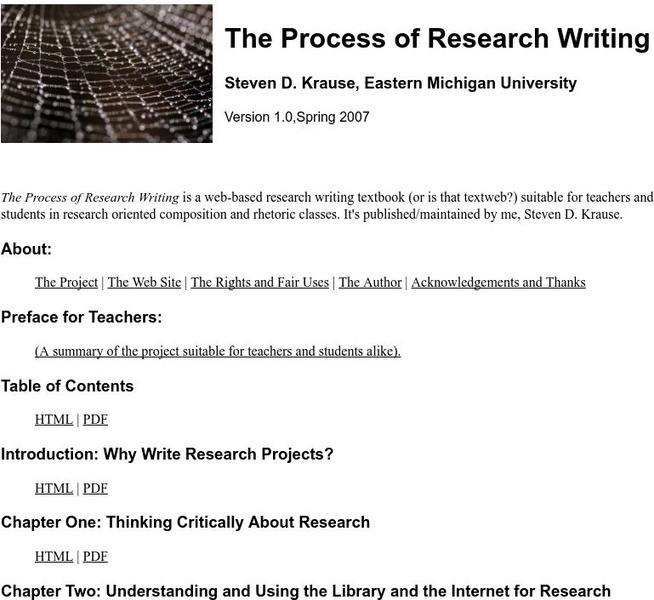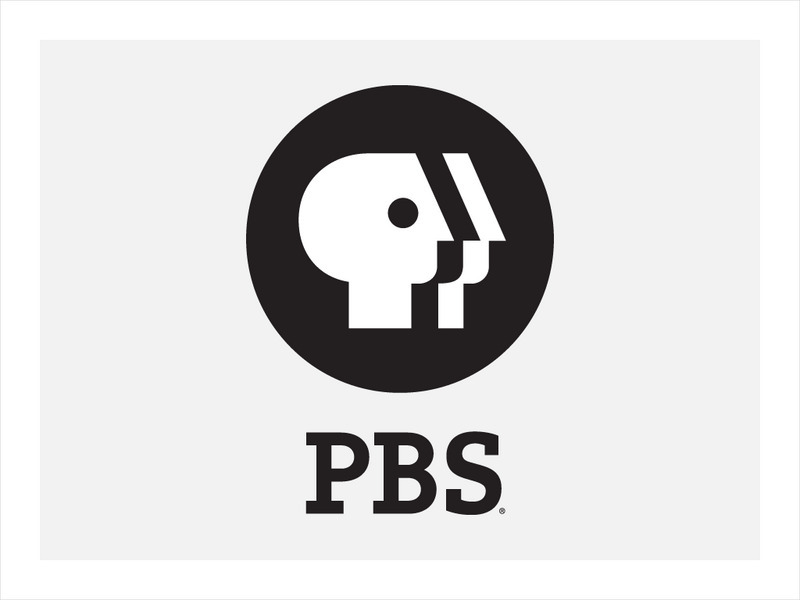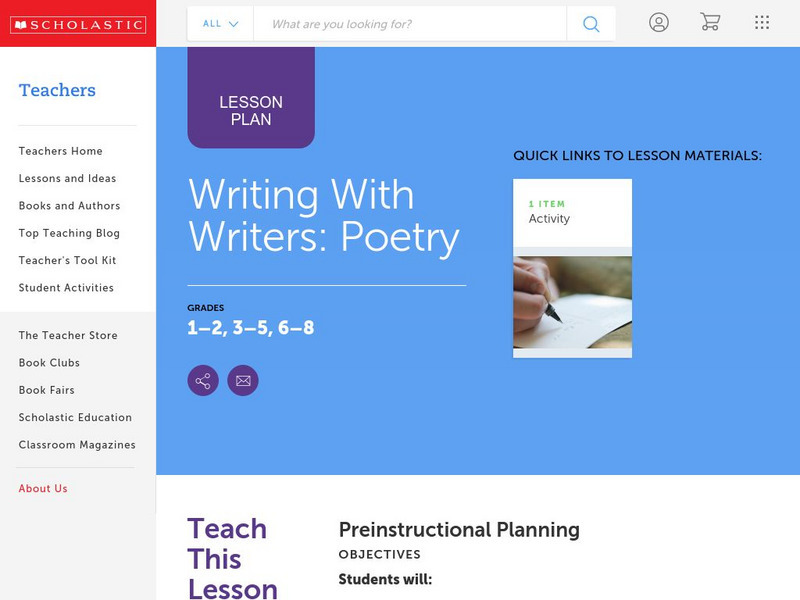Hi, what do you want to do?
New York State Education Department
TASC Transition Curriculum: Workshop 11
You'll C-E-R a difference in classroom achievement after using a helpful instructional activity. Designed for economics, civics, government, and US history classes, participants practice using the CER model to craft arguments about...
EngageNY
TASC Transition Curriculum: Workshop 12
How can opinions slant facts? Workshop participants learn how to examine primary and secondary sources and identify the author's point of view. They also examine how visual art impacts the meaning and rhetoric of sources. Full of...
Annenberg Foundation
Annenberg Learner: Write in the Middle: Workshop 5: Teaching Multigenre Writing
Workshop 5 centers on multigenre writing, an eclectic approach to writing instruction that offers students a wide range of options for expressing ideas and communicating knowledge. As students explore different avenues for translating...
Better Lesson
Better Lesson: Audience, Tone, and Style in Informative Text
Students will read samples of informative writing and highlight examples of how tone and style are used by the authors. Students will then apply this knowledge by writing their own informative text. Multiple examples of student work and...
Utah Education Network
Uen: Text Structures Informational Writing/mesopotamia Unit
This module provides an 18-day unit about Mesopotamia. Teachers of the unit will explicitly teach students about text structures, summary writing, reading informational texts, and writing a book about Mesopotamia.
University of Sydney (Australia)
University of Sydney: The Write Site: Evaluating Your Evidence
This essay resource teaches students how to select the type of evidence that best lends weight and credibility to their topics and how to organize the evidence effectively. A chart is provided as a quick reference. Click on pages 2-4 at...
Better Lesson
Better Lesson: Writing a Topic & Concluding Paragraph for the Essay
This lesson is a final step towards supporting young scholars to practice writing an informative/explanatory paragraph conveying complex ideas and presenting information clearly and accurately. Second-grade students can usually write a...
Better Lesson
Better Lesson: The Butter Bees
Students will compare the characteristics of the butterbee. Then they will engage in informative writing to share the information.
Better Lesson
Better Lesson: A Storm of Ideas
The first step in writing an informational text on the topic of students' choice is helping the student choose a topic of interest. Students will brainstorm ideas that will be possible final topics.
Better Lesson
Better Lesson: Writing an Opinion Based on Facts From a Text
Students will plan a paragraph that states their opinion and cites evidence to justify their opinion about an informational text. This lesson uses biographies since students can easily be able to write down factual information from the...
ReadWriteThink
Read Write Think: Creative Writing Through Wordless Picture Books
Need help planning ways to creatively teach your students chronological order? Here's a great place to start. While the site is specifically geared toward the middle school student, it is a teaching idea which could easily be adapted for...
Texas Education Agency
Texas Gateway: The Writing Process: Generate Ideas and Questions
[Accessible by TX Educators. Free Registration/Login Required] A learning module that teaches students how to generate ideas and questions as a part of the writing process in five mini-lessons: Introduction, Writing the Persuasive Essay:...
Better Lesson
Better Lesson: W.3.2: Write Informative/explanatory Texts to Examine a Topic
Links to 56 lessons and activities that build student skills in standard W.3.2: Write informative/explanatory texts to examine a topic and convey ideas and information clearly.
TES Global
Tes: Leaflet Writing Frame
[Free Registration/Login Required] This writing assignment provides a blank template for students to use when writing a leaflet. The template can easily be modified to the requirements of the assignment.
Better Lesson
Better Lesson: W.3.2a: Introduce a Topic and Group Related Information
Links to 18 lessons and activities that build student skills in standard W.3.2a: Introduce a topic and group related information together; include illustrations when useful to aiding comprehension.
TeachEngineering
Teach Engineering: Get the Word Out at Mc Donalds!
Students take part in a hypothetical scenario that challenges them to inform customers at a local restaurant of how their use and disposal of plastics relates/contributes to the Great Pacific garbage patch (GPGP). What students...
Other
The Process of Research Writing
This online book outlines a process for teaching research and writing in ways beyond the traditional, one-time, massive "research paper" Lots of food for thought. The chapters take you through the writing process and more. Click on the...
PBS
Pbs Teachers: Story Writing With Arthur
This series of 12 downloadable activities teach students some basics of story writing, using books or videos from the PBS "Arthur" series as a springboard. Activities include creating story maps, asking questions about characters and...
TeachEngineering
Teach Engineering: Where Are the Plastics Near Me? (Field Trip)
An adult-led field trip allows students to be organized into investigation teams that catalogue the incidence of plastic debris in different environments. These plastics are being investigated according to their type, age, location and...
Scholastic
Scholastic: Poetry Writing
This site comes from the Scholastic website and provides a teacher's guide to writing poetry. This lesson plan is put together very well and provides an outline of the project, learning objectives, assessment information and much more.
BBC
Bbc Skillswise: Writing a Letter
This Skillswise site focuses on letter writing. Included is a video about why it is important to learn about letter writing, fact sheets and worksheets for instruction, and quizzes on the information presented. The Skillswise sites from...
Colorado State University
Cswc: Plagiarism: Understanding and Addressing It
A site that defines and describes the dangers and realities of plagiarism. Also gives information on why students plagiarize, strategies for preventing, making plagiarism-proof assignments, and links to other sites.
Better Lesson
Better Lesson: Walking Through the Jungle
For this lesson, students will read and discuss story events and then write an informative sentence about one of the events.
Better Lesson
Better Lesson: What Did Jimmy's Boa Eat? 1 of 2
In this lesson, students will write an informational paper by comparing fictional text and a non fiction text about boa constrictors.









